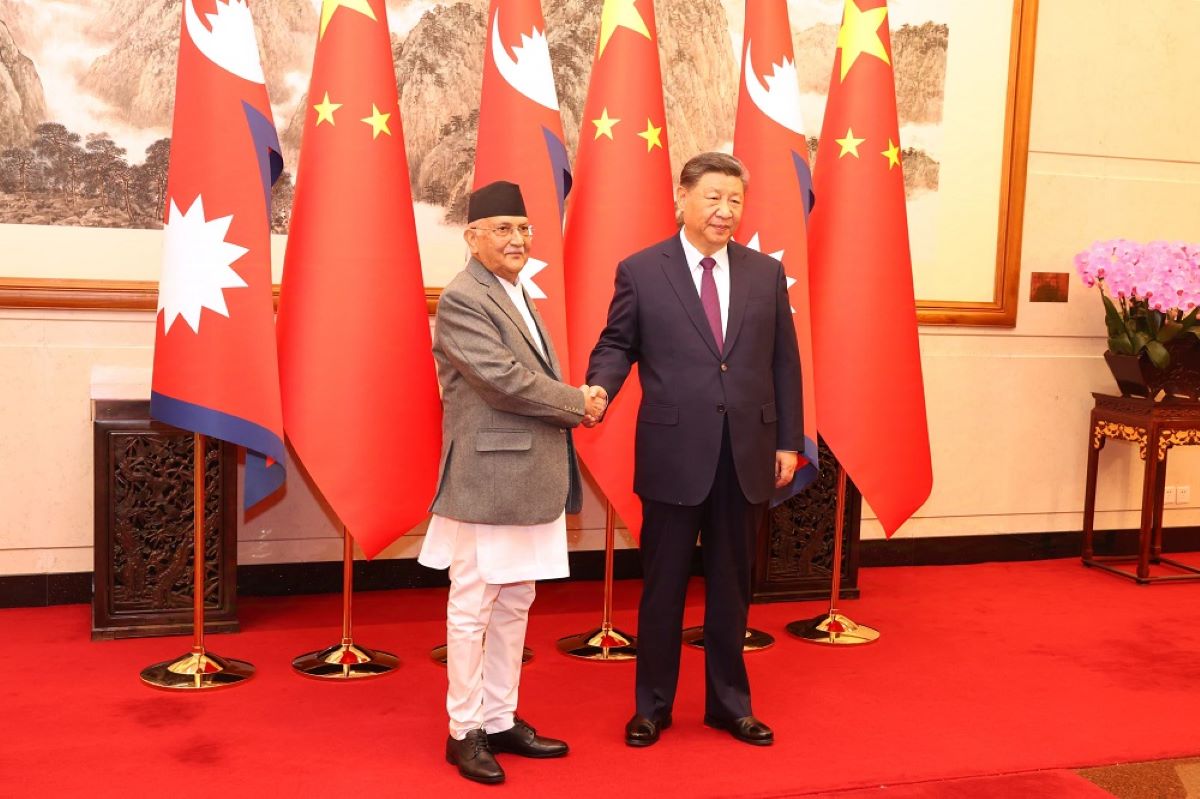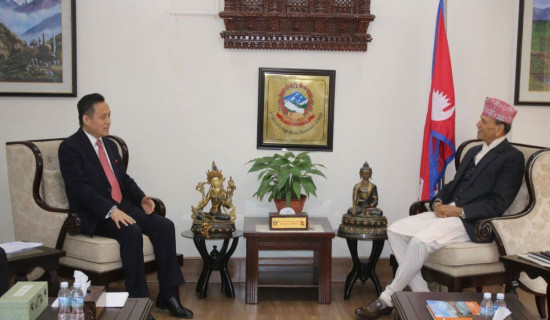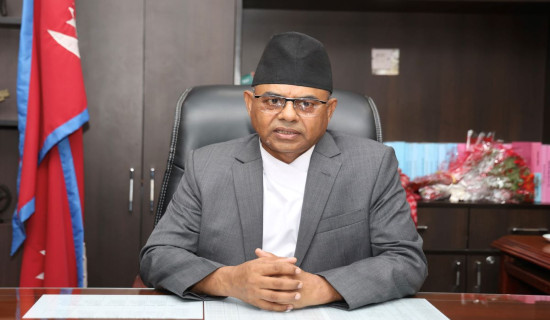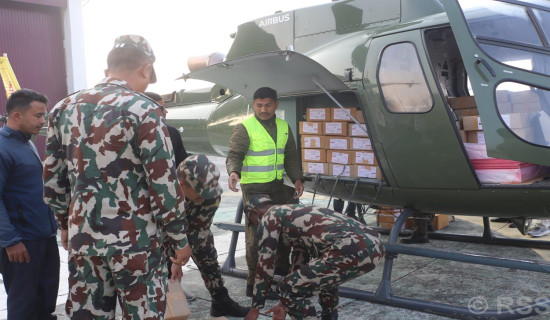- Wednesday, 25 February 2026
China and Nepal: Friendship Across the Himalayas
Xiaoming Bai
Prime Minister of Nepal Khadga Prasad Sharma Oli (KP Sharma Oli) visited China leading an 80-member delegation from December 2nd to 5th, 2024. During this visit, on the afternoon of the 3rd, Chinese President Xi Jinping met with Prime Minister Oli in Beijing, and both sides issued the 'Joint Statement between the People's Republic of China and Nepal'. President Xi highly appreciated Prime Minister Oli's long-standing commitment to China-Nepal friendship and emphasized that China and Nepal are good neighbors, friends, and partners connected by mountains and rivers. The two countries have always maintained sincere treatment, mutual respect, and support, ensuring the healthy and stable development of bilateral relations. President Xi pointed out that next year will mark the 70th anniversary of China-Nepal diplomatic relations. China highly values its relationship with Nepal and places it in an important position in its neighborhood diplomacy. China is willing to work with Nepal to uphold the original aspirations of diplomatic relations, consolidate traditional friendship, and promote the strategic cooperative partnership between China and Nepal towards development and prosperity to achieve new and greater developments. This meeting not only consolidated the friendly relations between the two countries but also laid a solid foundation for future cooperation.
The friendly exchanges between China and Nepal have a long history, dating back over a thousand year. This history is filled with cultural exchange gems. For example, the famous Nepali architect Araniko designed the White Pagoda of Miaoying Temple in Beijing during the Yuan Dynasty, which not only showcases the unique charm of Nepali architecture but has also become a cultural landmark in Xicheng District, Beijing, attracting many tourists and serving as a vivid testimony to the cultural exchange between the two countries. Since the establishment of diplomatic relations between China and Nepal, the traditional friendship between the two countries has been continuously consolidated and developed amid complex and changing international and domestic situations.
In 2019, President Xi Jinping paid a state visit to Nepal, during which the leaders of the two countries jointly announced the elevation of China-Nepal relations to a strategic cooperative partnership for development and prosperity, injecting new momentum into the development of bilateral relations. In 2025, the two countries will celebrate the 70th anniversary of the establishment of diplomatic relations. At this historic moment, Nepali Prime Minister KP Sharma Oli chose China as the first country to visit after resuming his position, which not only demonstrates Nepal's high regard for the traditional friendship between China and Nepal but also has important significance for deepening bilateral relations and promoting cooperation in various fields.
China and Nepal have always maintained a firm stance of mutual support on issues involving each other's core interests and major concerns, which has laid a solid political foundation for the long-term stable development of bilateral relations. During Prime Minister KP Sharma Oli's visit, both sides reaffirmed their common position on this issue. Prime Minister Oli solemnly reiterated that Tibet and Taiwan are inalienable parts of China's territory, and the Nepal firmly adheres to the One China policy. Nepal clearly stated that it will not allow any forces to use Nepali territory for anti-China activities that harm China's interests and firmly opposes any foreign interference in China's internal affairs. China highly appreciates this and reiterates its respect for Nepal's development path chosen according to its national conditions, firmly supporting Nepal's efforts to maintain national independence, sovereignty, and territorial integrity. China is willing to continue deepening strategic mutual trust with Nepal and maintain firm mutual support on issues involving each other's core interests. In the joint statement, both sides further reaffirmed that the China-Nepal border has long been delineated, serving as an important bond of friendship between the two countries and a bridge for cooperation. Therefore, the two countries agreed to conduct a joint border inspection and strive for the early entry into force of the Agreement on China-Nepal Border Management System. This joint statement forcefully refutes the distorted reports by some external media attempting to disrupt the bilateral relations and political mutual trust between China and Nepal using the China-Nepal border issue, demonstrating the high degree of consensus and firm stance of China and Nepal on the border issue.
In the construction of the international governance system and cooperation among global South countries, China and Nepal have always maintained close and in-depth cooperative relations, jointly safeguarding the common interests of the vast number of developing countries. Both sides have reiterated in multiple high-level exchanges that they will further strengthen coordination and cooperation within the United Nations framework, jointly promoting the construction of a fair and reasonable world order and achieving the goals of inclusive and beneficial economic globalization. To this end, the two countries will work together to promote the evolution of the global governance system towards a more just and reasonable direction. Nepal firmly supports and actively participates in China's Global Development Initiative, believing that this initiative provides new ideas and solutions for global development. As an active response to this initiative, Nepal has joined the "Friends of the Global Development Initiative" group, demonstrating Nepal's positive stance in global development cooperation. China warmly welcomes this and looks forward to working with Nepal to jointly promote the realization of common development visions and make greater contributions to the global development cause.
On the eve of Oli's visit, some Nepali domestic media and international public opinion once again brought up old topics, hyping up the obstruction of the Belt and Road Initiative (BRI) projects in Nepal and the so-called "debt trap" created by China, attempting to interfere with bilateral cooperation. However, as Oli emphasized during his meeting with President Xi Jinping, China-Nepal relations are based on friendship, equality, and mutual respect, and there are only friendships, no problems. Nepal expressed gratitude for China's valuable support during difficult times and its willingness to continue actively participating in the BRI, welcoming more Chinese enterprises to invest in Nepal and deepen practical cooperation in various fields. During the talks, the two countries reached a consensus on multiple areas and signed a series of cooperation agreements. These cooperation not only cover traditional fields such as economy, trade, and infrastructure but also expand to culture, education, science, and technology. The signing of these agreements marks a further expansion of the depth and breadth of China-Nepal cooperation, laying a solid foundation for the future development of bilateral relations. Through these cooperation, China and Nepal have not only achieved mutual economic benefits but also deepened mutual understanding and friendship at cultural and social levels, bringing tangible benefits to the people of both countries.
In this joint statement, both sides agreed to strengthen the alignment of their development strategies and further promote high-quality BRI cooperation. Both sides expressed their willingness to sign a memorandum of understanding on promoting the construction of a China-Nepal trans-Himalayan connectivity network and a cooperation framework agreement on jointly promoting the BRI as soon as possible. Both sides committed to strengthening connectivity in ports, roads, railways, aviation, power grids, and communications to help Nepal transform from a "landlocked country" to a "land-linked country." It is a happy matter that just a day after they issued the joint statement, Nepal and China singed BRI Cooperation Framework.
Regarding the port construction highly concerned by Nepal, the 14 traditional border trade points between the two countries have been fully reopened and are operating normally in 2024, playing a key role in promoting bilateral trade and facilitating the lives of border residents. In the highly anticipated China-Nepal railway project, both sides announced in the joint statement that they would steadily advance the feasibility study of the Gyirong-Kathmandu cross-border railway project and plan to hold the 9th China-Nepal Railway Cooperation Working Meeting. China committed to continuing to help Nepal train talent in the railway field. Cultural exchanges between the two countries are not only a concrete manifestation of friendship but also an important driving force for the sustainable development of China-Nepal relations and economic and trade exchanges. In the joint statement, the two countries announced that they would further strengthen exchanges and cooperation in youth, education, culture, tourism, broadcasting, television, online audio-visual, and think tanks, deepening exchanges at all levels, including friendly cities. Both sides will further facilitate personnel exchanges, strengthen cultural exchanges, and pass on friendship from generation to generation. China welcomes Nepal's plan to hold the "Nepal Tourism Year 2025" promotion event in China and will encourage more tourists to visit Nepal. With the facilitation of personnel exchanges and the improvement of China-Nepal connectivity, Nepal is expected to see a significant increase in Chinese tourists in 2025, driving the development of transportation, accommodation, and catering services. China and Nepal are connected by mountains and rivers, with deep traditional friendship. At this new historical starting point, both sides will continue to uphold the Five Principles of Peaceful Coexistence, deepen cooperation in various fields, and promote the strategic cooperative partnership between China and Nepal towards development and prosperity to new heights. It is believed that with the joint efforts of both sides, China-Nepal relations will usher in an even brighter future, continuing to serve as a model of friendly coexistence between countries with different social systems and sizes, and making greater contributions to regional peace, stability, and prosperity.
(Xiaoming Bai is a scholar at College of Humanities, Honghe University, Mengzi, P.R. China)















